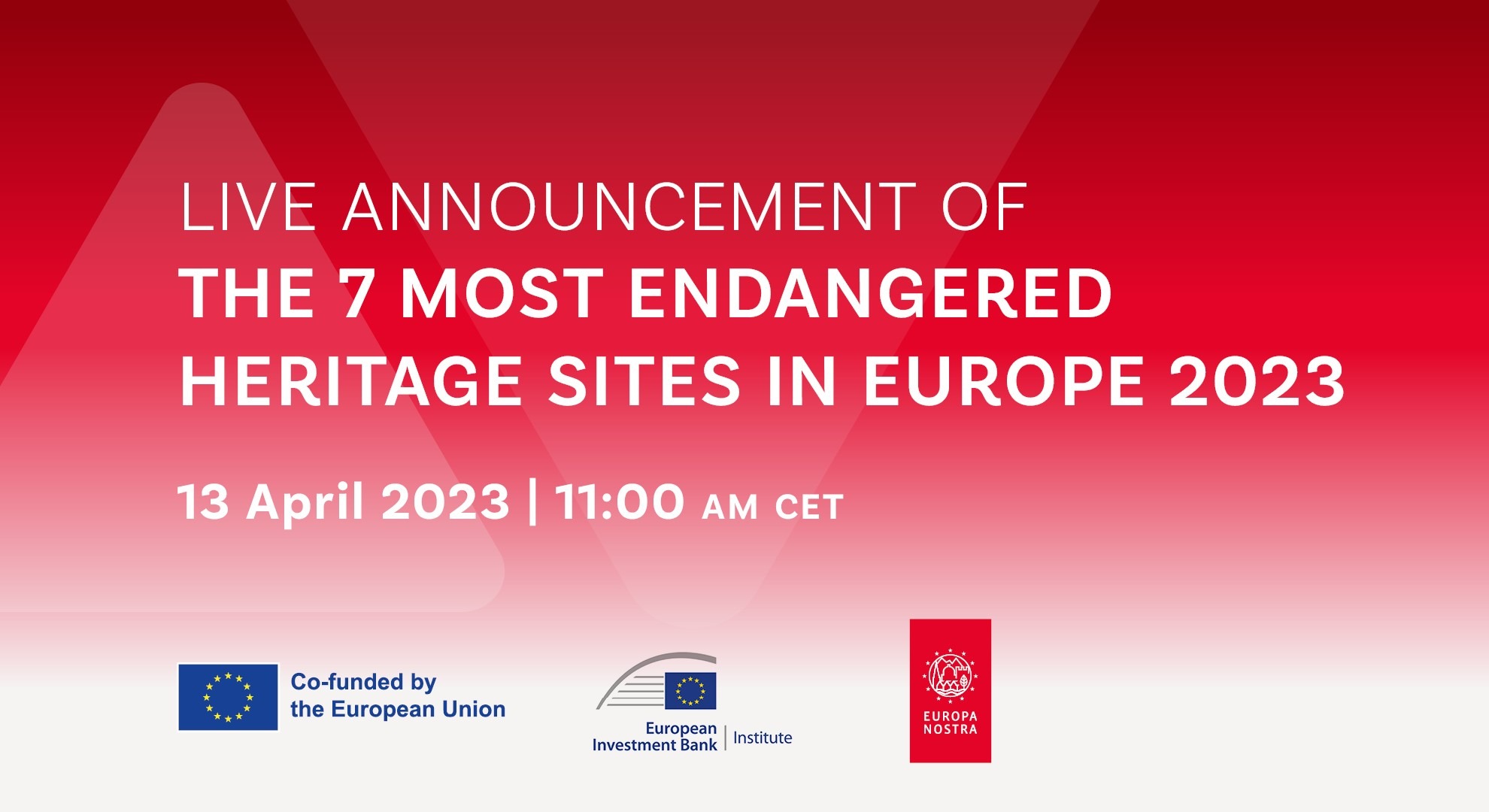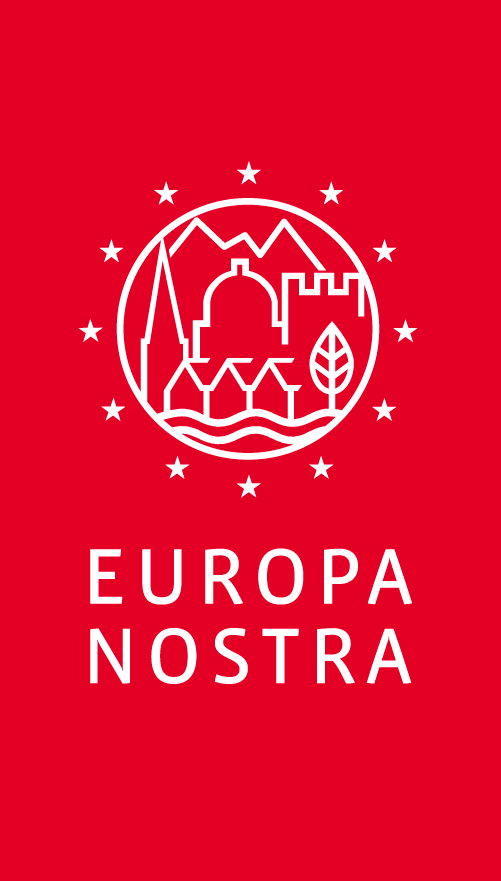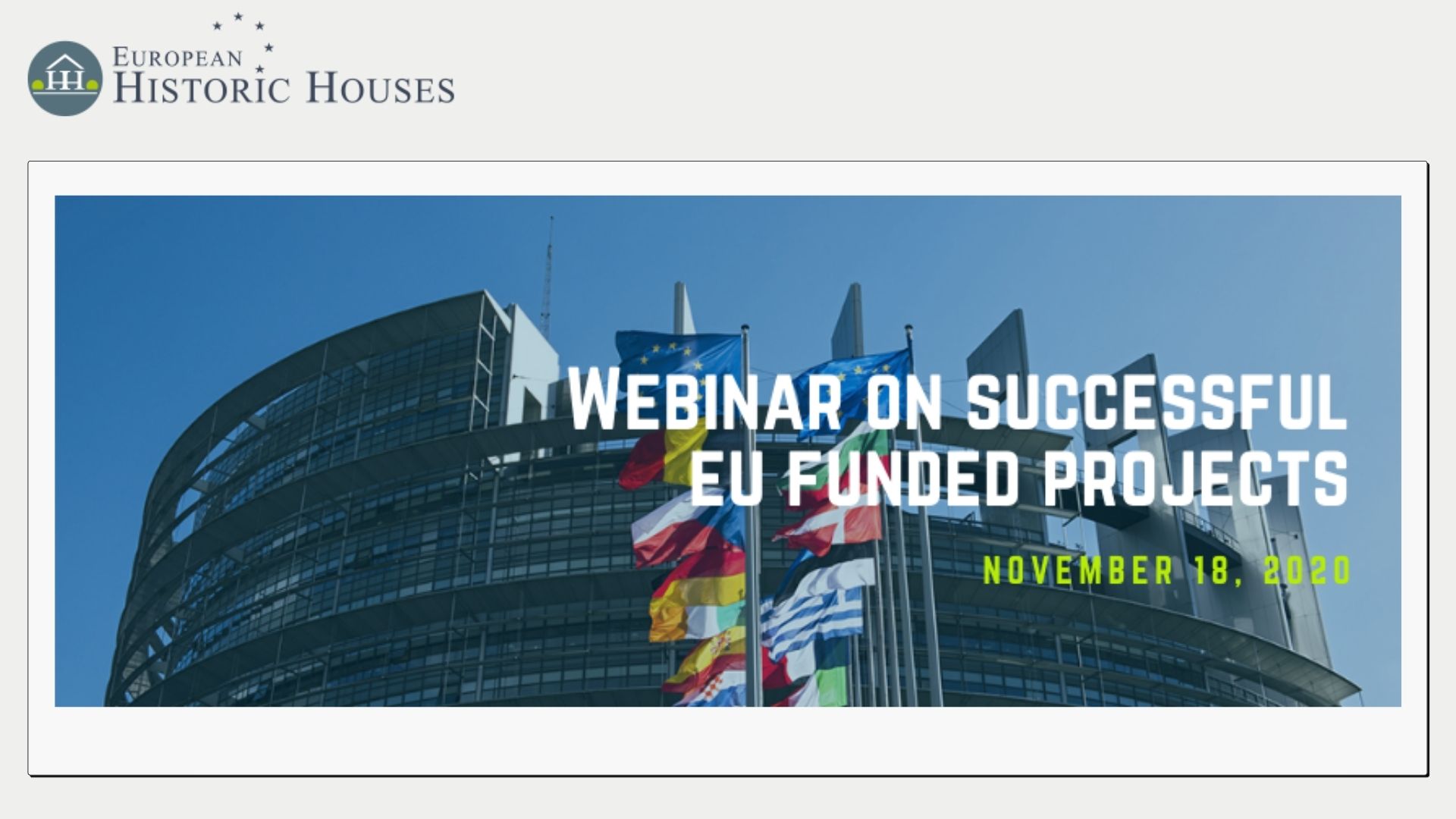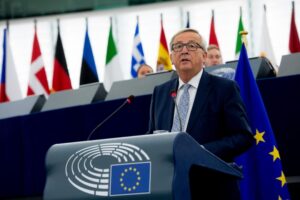
|


|
Wie schon in einigen Aussendungen beschrieben, steht gerade die EPBD (Energy Performance of Buildings Directive) im Europäischen Parlament zur Diskussion. Die Gefahr war, dass unsere historischen Gebäude, wenn sie nicht unter Denkmalschutz stehen, in die Kategorie G fallen. Dies würde bedeuten, dass deren Nutzung bzw. Vermarktung faktisch ausgeschlossen wird. Den europaweit national agierenden Verbänden zur Erhaltung historischer Gebäude und des kulturellen Erbes ist es unter der Führung von European Historic Houses gelungen, die Formulierung dahingehend wesentlich abzuändern.
Hier die Aussendung von EHH zu diesem Thema.
15 March [European Commission] Online
Invitation from Europa Nostra

The European Collaborative Cloud for Cultural Heritage will be a one-of-a-kind digital infrastructure that will enable unparalleled transdisciplinary and large-scale collaboration between cultural heritage professionals across the EU through cutting-edge digital tools. With an envisaged budget of €110 million until 2025 from Horizon Europe dedicated to support its development and establishment, the Cloud will foster cooperation and co-creation among cultural, creative and technology sectors and will help safeguard European cultural treasures through a digital infrastructure. On 15 March, the European Commission organises an online event to kick-start the formation of a community of practice between cultural heritage professionals and demonstrate how the European Collaborative Cloud for Cultural Heritage can be useful in their everyday work. All professionals in the field of Cultural Heritage who wish to be involved in this effort are invited to participate in the event.
How to register?
European Historic Houses
Our webinar on historic houses in the green transition was a real success! We would like to thank our President Alfonso Pallavicini, MEP Pernille Weiss, Architect Anders Brüel, Vice-Minister of Culture Vlastislav Ouroda, President Franziska Haas, Policy Officer Pau Garcia Audí and all the other experts that participated in the conversation. But most importantly, thanks to all the 200 participants and all the great questions that they asked! The European Green transition with the #GreenDeal #FitFor55 #EUClimateAction is a step towards preserving the environment but a threat to the millions of unlisted historic houses across Europe, which are worthy of protection. The proposed obligations pose a threat to the European historic patrimony, its cultural, aesthetic and historic legacy, by pushing a layer of our common European built heritage to silent destruction. Let us support the #GreenDeal while preserving and not threatening our built cultural heritage.

Name of the event: Webinar on Successful EU Funded Projects
Date: November 18, 2020
Location: Zoom
Number of participants: over 55
Number of registrations: over 130
Contact emails: e.oksiuta@europeanhistorichouses.eu; theodoracanciu@europeanhistorichouses.eu; m.malaspina@europeanhistorichouses.eu
Addendums: The recording of the webinar, the speakers’ presentations and the “Support Document of the Study ‘Heritage Houses for Europe’ – EU funding guide to family-owners of heritage houses”.
Webinar Summary
On November 18th, 2020, European Historic Houses organised a webinar where remarkable speakers from different European countries shared their successful experiences regarding EU funded projects.
The purpose of the webinar was to bring together private owners of historic heritage from a variety of countries across Europe and to promote discussion and information sharing among them on the topic of EU funding opportunities.
The event included four different sessions. Firstly, the EHH Executive President, Alfonso Pallavicini, welcomed all the participants and speakers. Then, the EHH Head of Office, Ewelina Oksiuta, presented the different EU funding opportunities and programmes that were going to be discussed by the speakers – Erasmus+, Creative Europe, the European Regional Development Fund and Cohesion Fund, and the European Agriculture Fund for Rural Development. The particularities of each programme and the respective way of accessing the EU funds can be found in the “Support Document of the Study ‘Heritage Houses for Europe’ – EU funding guide to family-owners of heritage houses”. This document will be sent by EHH to all the participants in the webinar, together with the recording of the webinar itself and all the PowerPoint presentations. After the six presentations of successful EU funded projects given by their protagonists and before saying goodbye, there was a fruitful question time, during which the participants had the chance to address questions directly to the speakers.
Multiannual Financial Framework 2021-2027
Very important to mention is that, in the abovementioned EU funding guide, the budget of each funding programme is based on the Multiannual Financial Framework (MFF) 2014-2020. As explained during Oksiuta’s presentation, there are some changes in the programmes from this point of view under the MFF 2021-2027, which should also be supplemented by the new Recovery Fund.
Erasmus+ 2021-2027
Total budget: +2,2 billion compared to the previous period.
Its new priorities are oriented towards more opportunities abroad for over 14 million people, inclusiveness, accessibility and international visibility.
Creative Europe
Total budget: 2.4 b EUR, i.e. 57% increase compared to 2014-2020 level.
Creative Europe is the only programme focusing exclusively on cultural and creative activities and enterprises, it falls under the ‚Cohesion and values‘ heading of the 2021-2027 multiannual financial framework.
As part of the new MFF, it will provide more opportunities for cultural and creative actors to run cross-border projects; more attention to digital transformation that affects the cultural and creative sectors and more support for the promotion of the European cultural and creative work beyond the EU.
European Regional Development Fund (ERDF) and Cohesion Fund (CF)
During 2021-2027, 65% to 85% of ERDF and Cohesion Fund resources will be allocated to these priorities, depending on Member States’ relative wealth.
The programs will focus more on achieving a smarter Europe, through innovation, digitisation, economic transformation, and support to small and medium-sized businesses, as well as a Greener, carbon-free Europe, implementing the Paris Agreement and investing in the energy transition, renewables, and the fight against climate change
European Agriculture Fund for Rural Development (EAFRD)
The EAFRD aims to foster the competitiveness of agriculture, ensure the sustainable management of national resources, support climate actions, and achieve a balanced territorial development of rural economies and communities. This also includes restoration, maintenance, and upgrading of cultural and natural heritage sites and rural landscapes. Thus, it is important to note that the EAFRD does not only fund farming-related activities but has a much wider scope.
Successful EU funded projects
The core part of the webinar was dedicated to the presentation of six successful EU funded projects.
The first project, presented by Lluís Bonet Agustí, Professor at the University of Barcelona, is an Erasmus+ project called “CHARTER – Cultural Heritage Action to Refine Training, Education and Roles”. Very important to mention is the fact that the European Historic Houses Association is one of the 25 partners of the project consortium.
The next project, presented by Alice Bovone, Chief Operating Officer at Le Dimoredel Quartetto, is another successful Erasmus+ project called “MUSA: European young MUsicians soft Skills Alliance”. ADSI, the Italian historic houses association, is associated partner of the project.
Afterwards, Stefania Pignatelli, cultural entrepreneur operating in the Italian region Marche, introduced a successful Creative Europe project called “OPHERA – OPening cultural HERitage to communities during the central-Italy post-earthquAke long-term restoration process. Digital technologies and new competencies for cultural professionals”.
The following project to be presented was another Creative Europe, named “Artists in Architecture Re-Activating Modern European Houses”, coordinated and presented by Francis Carpentier and Magdaléna Lišková, respectively Curatorial Project Coordinator and Head of Institutional Relations of BOZAR, the Brussels Centre for Fine Arts.
Then, Prof. Heinz Schinner, owner of Scholss Rotenturm in Austria, and Dr. Martina Bergmann, his personal assistant, talked about the renovation of Schloss Rotenturm, whose project was co-funded by the European Regional Development Fund (ERDF).
Finally, the last successful experience was presented by Pol de la Pintière: it was about his successful renovation project of Château d’Auteuil based on the LEADER method and co-funded by the European Agricultural Fund for Rural Development (EAFRD).
Outcomes
The EHH Webinar on Successful EU Funded Projects had an extremely positive outcome. Many were the participants and many were also those who would have liked to participate but could not: for technical reasons, EHH could not accept more than a certain number of people in the video call on the Zoom platform. This is why, as previously mentioned, EHH will send to everyone the recording of the webinar itself. The atmosphere throughout the whole webinar was formal and friendly at the same time: the speakers presented their interesting personal experiences and then made themselves available to answer all the numerous and stimulating questions the participants asked them.
EHH intends to continue raising awareness among its members on the issue of the access to EU funds, which EHH believes is particularly important for the sector of privately-owned historic houses. Through the presentation of some success stories during the webinar, EHH aimed at stimulating some interest in the topic, in anticipation of and waiting for our next events. As a matter of fact, this webinar is intended to be a foretaste of the Seminar on the EU and Access to Funds that EHH was organising in Brussels this autumn and which for obvious reason was postponed and will take place (hopefully) next spring.
10 April 2020
Dear Readers,
As already announced in the special edition of the Europa Nostra Newsletter dated 3 April, we now, more than ever, feel the need to be closer together while staying physically apart. Inspired by the spirit and the culture of solidarity, we are proud to present to you our brand new initiative, called the Europa Nostra Agora, born as a creative response to the ongoing confinement and physical distancing to combat the COVID-19 pandemic.
This initiative aims to provide a virtual platform to share and promote digital communication related to culture and cultural heritage from across Europe and the world. By sharing and promoting news and content via this weekly update and on social media, we wish to make a modest but meaningful contribution to enhancing the resilience and positive interaction between Europe’s citizens during the trying times related to the COVID-19 pandemic.
This is the first update with a selection of links and relevant information which we aim to disseminate every week through our wide network of members and partners. We have opted for a simple and factual format of communication for the benefit of all. We also invite you to visit a dedicated online platform which will continue to grow over time
On the occasion of Raffaello’s 500th death anniversary, the biggest exhibition ever devoted to the famous Italian and European Renaissance artist opened on 5 March in Rome’s Scuderie del Quirinale. As the exhibition was forced to close its doors just four days after its opening due to the nationwide lockdown in Italy, the museum has released a video visit available on YouTube. To pay tribute to this immense artist, we have chosen to illustrate our digital Agora with one of his most famous masterpieces: the „School of Athens” from the Raphael Rooms of the Vatican Museums.
The Europa Nostra Agora remains a “work in progress”. Therefore, we invite your feedback with concrete suggestions for its improvement and further development. We also thank you for sharing regularly with us your creative initiatives for inclusion in the Agora (att. Manon Richard, agora@europanostra.org).
We wish you a very warm welcome to the Europa Nostra Agora!
#Stayathome #Allwillbewell
#CreativeEuropeAtHome
Sneška Quaedvlieg-Mihailović
Secretary General
European Commission President Jean-Claude Juncker addressed the European Parliament in Strasbourg today in his annual State of the Union speech, taking stock of Europe’s political situation and outlining priorities for 2018, the year which coincides with the European Year of Cultural Heritage.
Juncker’s third State of the Union speech was delivered under the motto “wind in our sails”, calling the current situation a “window of opportunity” to shape the future of Europe. When outlining his “personal scenario number 6” for the future of the European Union, the EC President stressed his firm “love for Europe”: “Love for Europe because Europe and the European Union have achieved something unique in this fraying world: peace within and outside of Europe. Prosperity for many if not yet for all. This is something we have to remember during the European Year of Cultural Heritage. 2018 must be a celebration of cultural diversity”. The European Parliament welcomed the reference to the European Year with a strong applause.
